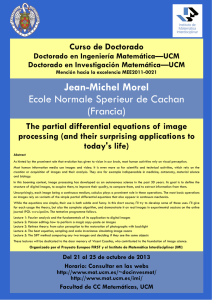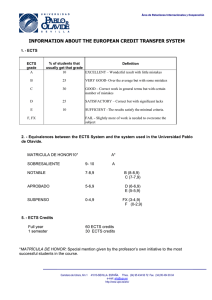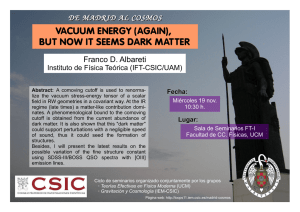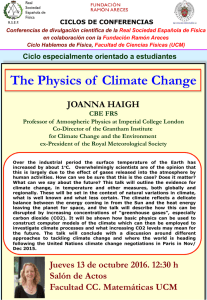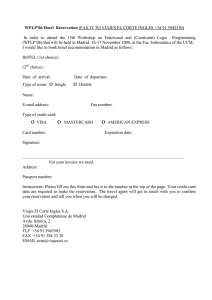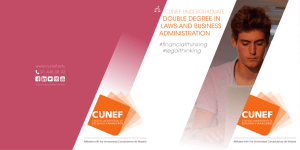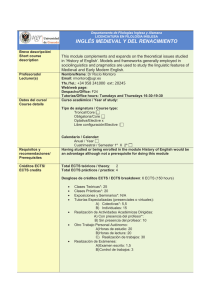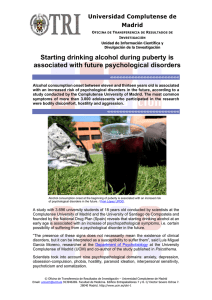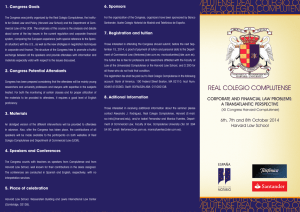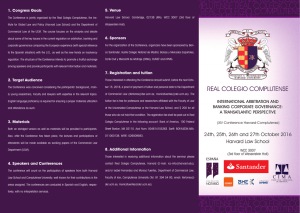COMPLUTENSE DE MADRID
Anuncio
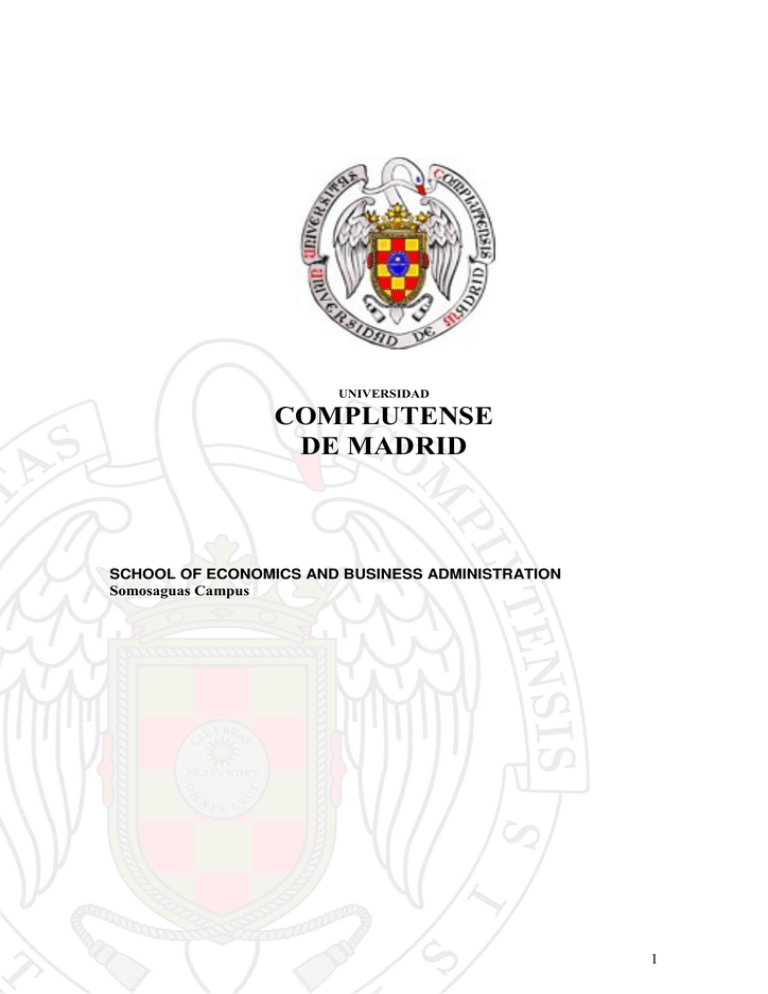
UNIVERSIDAD COMPLUTENSE DE MADRID SCHOOL OF ECONOMICS AND BUSINESS ADMINISTRATION Somosaguas Campus 1 DEAN: Dr. Begoña García Greciano INTERNATIONAL VICE-DEAN: Dr. Elena Urquía Grande • e-mail: [email protected] INTERNATIONAL OFFICE: • • • Coordinator: Ms. Susana Martín de Saavedra Bernal Phone: (+00 34) 91 394 23 37 Fax: (+00 34) 91 394 24 47 • e-mail: • [email protected] [email protected] [email protected] Address: Universidad Complutense de Madrid Pabellón Central – Fac. CC.EE. y EE Campus de Somosaguas 28223- Madrid – España http://www.ucm.es/centros/webs/fccee/ [email protected] 2 INDEX 1.- THE CITY OF MADRID. GENERAL USEFUL INFORMATION 1.1.- How to reach Madrid 1.2.- Currency matters and Cost of Living 1.3.- Public Hospitals 2.- THE COMPLUTENSE UNIVERSITY 3.- SCHOOL OF ECONOMICS AND BUSINESS ADMINISTRATION 3.1.- General Information 3.2.- Facilities 3.3.- Health 3.4.- C.O.I.E 3.5.- Student Associations / 3.6.- Accommodation 3.7.- Language Requirements 4.- STUDYING AT ADMINISTRATION THE SCHOOL OF ECONOMICS AND BUSINESS 4.1- Degree in Economics 4.2- Degree in Business Administration 5.- ACCEPTANCE PROCEDURES 6.- FOREIGN STUDENTS ARRIVAL AT SOMOSAGUAS CAMPUS ADMISSIONS AND REGISTRATION PROCESSES 7.- LOCAL COORDINATORS FOR EXCHANGE STUDENTS 3 PREFACE Our University is the largest and one of the oldest educational institutions in Spain. It exhibits excellent research and high quality teaching standards being well known nationally and internationally. It also has an excellent location close to Madrid´s City centre. Currently, it has a large number of international exchange agreements with foreign universities due to the needs stemming from the creation of the European Higher Education Area (EHEA). In order to make our University more attractive to foreign students, the new Bachelor Degrees in Economics and Business Administration (fully adapted to the methodological requirements of the EHEA) will have at least one group where ALL modules will be taught in English. This means that incoming students will be able to choose among a very wide range of modules offered by our School either in Spanish or in English. Furthermore, our School also offers foreign students the possibility of gaining some professional training in companies settled in Madrid. Students of other institutions studying at Universidad Complutense can look for and find a work placement before they leave their universities. Students may also use the placement service at our Faculty. 1. -THE CITY OF MADRID • • • • Located in the centre of Spain Capital of Spain 3.5 million inhabitants 4.5 million people, including the metropolitan area • Old buildings of historic interest and modern architecture The official web site (http://www.munimadrid.es) is in Spanish and English. It covers all kind of information, including history, theatres, shows, museums, art exhibitions, fairs, congresses, sports, accommodation, gastronomy, shopping, culture, transport, night life, business, a city guide, etc. 1.1. -How to get to Madrid o BY PLANE: Barajas web site: http://www.aena.es/csee/Satellite?pagename=Aeropuerto_MAD Carretera Barcelona N.II Km. 10,5 Airport information: telephones: 91 3058343/44/45/46 Once you arrive to the airport of Barajas, there are three options to go downtown: 4 Take the subway: Subway station “Aeropuerto” Line 8 (Barajas-Nuevos Ministerios) Price: €4.50 the single ticket; €12,20 the 10- trip ticket. Subway web site: http://www.metromadrid.es / Take the bus: the bus service costs €5. These buses run every 15-20 minutes from Barajas Airport to Atocha-Renfe; Cibeles square; O’donnel street. Bus web site: http://www.emtmadrid.es/lineaAeropuerto/index.html Take a taxi: The price is about €20 (there are extra charges on bank holidays and weekdays after 12:00 p.m. o BY RAILWAY Railway Information & Reservation Phone: 34 91 328 90 20 RENFE web site: http://www.renfe.es o BY BUS Central Bus Station: Calle Méndez Álvaro. Phone: 34 91 468 42 00 Bus web site: http://www.estacionautobuses.com 1.2. -Getting around Madrid • CITY BUSES Time: from 6.00 to 23:30/24.00 (depending on the lines) Most bus stops have detailed city maps posted with bus routes. There is a reduced bus night service reaching most areas and quarters (called “Buhos”) every 20 minutes (until to 6:00 am) • SUBWAY Service from 6.00 to 1.30 am METRO web site: http://www.metromadrid.es/ Information on all regional public transports: http://www.ctm-madrid.es/ 1.3. -Public Hospitals Public hospitals are available for any urgency. Public hospitals are available in: http://www.madrid.org/cs/Satellite?cid=1162209993137&pagename=PortalSalu d%2FPage%2FPTSA_listaHospitales 2. - COMPLUTENSE UNIVERSITY • • • • UCM (Universidad Complutense de Madrid) is a public institution It is one of the oldest universities in the world, founded in 1499 UCM is Madrid’s University. It is one of the largest universities in the world: http://www.ucm.es 80,000 students 4,000 foreign students 6,000 staff teachers 5 3,500 non academic staff (administration and services) 26 Faculties • UCM is divided in three campuses, Moncloa, Somosaguas, and Aranjuez; most of the faculties are located in Moncloa except the Faculties of Political and Social Sciences, Economics & Business Administration, and Psychology, as well as the Social Work School, which are located in Somosaguas, northwest of Madrid. 3. – SCHOOL OF ECONOMICS AND BUSINESS ADMINISTRATION 3.1. • • - General Information It is located in the Campus of Somosaguas. Website http://www.ucm.es/centros/webs/fccee/ 6 How to get to Somosaguas Campus The best way to reach the Campus is by bus. Line A from Moncloa Line H from Aluche Line I from Moncloa Campus (Ciudad Universitaria Subway Station) You can also take a tramcar that goes between the metro station “COLONIA JARDIN” and the “ESTACIÓN DE ARAVACA.” The station is located the campus and the name of the station is “CAMPUS DE SOMOSAGUAS”. The School of Economics and Business Adminitration has always served the commuter student. Its philosophy has always recognized the needs of students who live and work within the region. The School has developed and strengthened services to meet the needs for flexibility and convenience of the student. The location and the role of the School in the cultural, political, civic, social, and corporate communities provides opportunities for exploration and growth, and also cultivates a spirit of independence, experimentation, and discovery that a more traditional classroom instruction cannot provide. 7 3.2. - Facilities The Somosaguas campus is made up of the following centres: Central building establishes the departments of Administrative and Planning Services, computer and printing facilities, dean, vice-deans, assistants, auxiliary services, and personnel. It also houses the INTERNATIONAL STUDENT OFFICE The “prefabricado” (building 1), holds some departments, the cafeteria and food services, lounge, etc. Buildings 2, 3, 4, and 5 establish classrooms and department facilities. “Aulario” (classroom building) includes classrooms, cafeteria, health services, and audio-visual and computer facilities. Library Sport facilities Parking indoor (faculty/staff lots) and outdoor (students) Building works were started in the academic year 2007-2008 to substitute the buildings of offices and services (Vice-Dean’s Office and Secretariat) for a new building annexed to the Aulario building. With this new building the School of Economics and Business Adminstration adopts a three-pillar structure: CLASSROOM BUILDING, DEPARTMENT BUILDING AND LIBRARY. LIBRARY • It is one of the most important libraries on Business and Economics in Spain. (The second one after the Central Bank library) • Its collection contains about 115,000 books + 2,100 papers +700 electronic journals. All these sources are mostly of free-access. • Among the services offered by the library we have: regular & inter-library loans, information and bibliographic searches, etc. For more information regarding the Faculty of Business and Economics Library, please visit the web site: http://www.ucm.es/BUCM/cee/ e-mail: [email protected] - - The European Documentation Centre is placed within the premises, and it is part of the information centre network created by the European Union for all member States. This centre provides quick and easy access to European databases. Web site: http://www.ucm.es/BUCM/be COMPUTER FACILITIES The Computer Head Office (Somosaguas Campus) provides e-mail accounts to every exchange student. There are several Computer Areas available for all students, free of charge. SPORT FACILITIES Complutense University has five sport centres: Four sport centers in Moncloa Campus: 8 1. North (Paraninfo): Handball, Football, Basketball, Tennis Ground, Football ground, Rugby ground Phone: 00 34 91 60 93 00 34 91 60 92 Location: Avda. Complutense s/n Fax: 00 34 91 394 60 99 Mail: [email protected] 2. South: Basketball, Gym, Handball, Volley-beach, Tennis, Swimmingpool, Athletics ground: 300 m. Phone: 00 34 91 394 11 69 Location: Avda. Juan de Herrera s/n 3. Southeast ( Cantarranas) Phone: 91 394 16 53 Location: Arquitecto López Otero s/n 4. Nuestra Señora de la Almudena: Phone: 00 34 91 394 62 66 Location: Calle de las Moreras s/n 5. Somosaguas Campus: Basketball, Handball, Tennis, Volleyball. Gym Phone: 00 34 91 394 23 98 The UCM sport centre organises different activities for class groups such as: aerobic, swimming, tennis, gim-jazz, latin dance, tai-chi. Fee for group class: 29 Euros (Quarterly payment) For detail information please visit the following web-site: http://www.ucm.es/dir/2730.htm MEDICAL CENTER OF SPORT EVALUATION If you need or wish to take a medical-sport test you can register in the Medical Center of Sport Evaluation: Avda. Juan de Herrera, s/n Phone: 00 34 91 394 11 69 [email protected] www.ucm.es/info/meddepor/index.html 3.3. • • • • - Health There is a medical service at the Somosaguas Campus available for staff and students. The students from the EU are members of their National Social Security System. Before coming to Madrid, they must request from their home Social Security Office the documents stating that their Social Security System will assume the costs of medical attention carried out in Spain by the Spanish Social Security System. Thus, the students will be treated free of charge in Spain by the doctors and the Social Security Hospital Network. Costs for dental treatments generally are not included in these arrangements. Students from other countries must have a private HEALTH INSURANCE. Members of private Health Insurance Schemes must make sure that they will cover the bills for treatments in Spain (some insurance companies require payment in advance to be refunded in the origin country). 9 3.4. - Centre for Employment Guidance and Information (C.O.I.E in Spanish) Centre for Employment Guidance and Information. There are offices in both campuses. The one held in Somosaguas Campus is located in the “Prefabricado” Building: Phone: 00 34 91 394 24 45 Fax: 00 34 91 394 24 49 @mail: [email protected] 3.5. - Student Associations There are many students associations at the Faculty of Business and Economics. Foreign students can register in any of them, following their personal interest on culture, sports, etc. ESN-UCM (Erasmus Student Network): It is of special interest for foreign students. This organization plans many activities throughout the academic year such as cultural trips, parties, weekend trips, guided visits trough the city, meetings to exchange languages, etc. To join them, you just have to go to their office and get the ESN Card. More than 1,200 students join them every year, taking part in several of their activities. They also manage the “Tutor Program”. It consists of the assignment of one local student to a group of exchange students to help them not only to achieve the university procedures and get information, but also with city way of life. CONTACT: www.esnucm.org Facultad de Estadística, Planta Baja 28040 Ciudad Universitaria Madrid T. +34 91 394 39 77 [email protected] AIESEC / AISEC: the world’s largest student organization. It is the international platform for young people to discover and develop their potential so as to have a positive impact on society. AIESEC also runs an exchange program that offers to over 4,000 students and recent graduates the opportunity of living and working in another country. It is located on our campus at the “Prefabricado” Building. Phone: 00 34 91 394 24 22 / 00 34 91 394 23 33 Fax : 00 34 91 394 23 64 e-mail: [email protected] web site: http://www.aiesec.org 10 Students Delegation: this organization promotes social and cultural activities. It’s located in the “Aulario” Building. Phone: 00 34 91 394 23 23 Sports Club: The main activities are rugby, volleyball, basketball, Hockey. Contact: C / Donoso Cortés 65. Phone: 00 34 91 394 64 90 Fax: 00 34 91 394 64 91 [email protected] 3.6. - Accommodation Although there is no on-campus housing at the Faculty, information regarding off-campus housing in the area is available at different sources. Provided by the University: ALOJAMIENTO EN LA UCM (ACCOMMODATION AT UCM) ALOJAMIENTO EN LA UCM (Accommodation at UCM) is a service that UCM offers to the university community, with special interest for our Erasmus students. It offers individual or shared apartments well connected by public transport, fully furnished and at the best price. ALL THE INFORMATION IS AVALAIBLE ON: http://casaestudiante.ucm.es/encuentra-tu-alquiler BY PHONE: 913941897 OUR OFFICE: Edificio de Alumnos Avda. Complutense, s/n 28040 Madrid, España. Subway: CIUDAD UNIVERSITARIA – Bus: G, I, U, 82, 132 YOU CAN ALSO ASK FOR INFORMATION TO: [email protected] Not provided by the University: If the student is interested on finding a place by himself/herself, we can recommend some web sites: Useful web sites: www.aluni.net/alojamiento-en-pisos/paraestudiantes/alquilar-habitaciones-en-apartamentoscompartidos/ for more information: [email protected] www.segundamano.es www.madrid.loquo.com www.anuntis.segundamano.es www.elidealista.com www.fotocasa.es Students can also write just “habitación, Madrid, alquiler” in google and they will find a lot of information regarding lodgings. 11 3.7. • - Language Requirements Regular courses are taught in Spanish. Therefore, foreign students must have an adequate command of Spanish. However, the School of Economics and Business Administration has a wide offer of courses in English. In fact, in both Bachelor Degrees of Business Administration and Economics there is a group where all courses are taught in English too. Spanish Language Courses • The UCM organises an Intensive Spanish Language Course free of charge for all exchange students before the beginning of each semester. Dates: September and February For detailed information concerning these courses, please contact: Erasmus Office. Facultad de Filología. UCM Phone: 00 34 91 394 54 00 Fax: 0034 91 394 394 55 78 e-mail: [email protected] • The UCM also offers a very wide range of language courses for foreign students all year round (both 90 and 45 lecture hour courses). Detailed information can by obtained at: CENTRO SUPERIOR DE IDIOMAS MODERNOS UCM C/ Donoso Cortés, 65 2ª planta Phone: 00 34 91 394 64 45 / 65 21 e-mail: [email protected] Web site: http://www.ucm.es/info/idiomas 12 4. -STUDYING AT THE SCHOOL OF ECONOMICS AND BUSINESS ADMINISTRATION This catalogue is not to be considered a contract between the student and the faculty. Each student is personally responsible for his or her academic progress, and all are urged to read this information. Our Faculty currently offers three bachelor degrees adapted to the European Higher Education Area. o Bachelor Degree in Business Administration (Grado de ADE) Duration: 4 years (3 years + 1 of specialization) o Bachelor Degree in Economics (Grado de ECO) Duration: 4 years (3 years + 1 of specialization) o Double Degree in Business Administration and Law (Doble Grado en Derecho-Ade) Duration: 6 years Total credits (ECTS): Business Administration: 240 Economics: 240 Double Degree: 360 • Total Courses offered: 395 annually + Doctoral Courses (in the process of reduction, due to the fact that the courses included in the “official masters programs” serve also as doctoral courses). The degree system should include the following issues, among others: • Establishment of a teaching system consisting of three cycles: Bachelor, Master and Doctorate. • Adoption of the European Credit Transfer System (ECTS) • Mobility of university students and professors. • Teaching-learning process: the creation of the EHEA implies an important change in the way of teaching and the methodology. Next to “Cuatrimestre”, the student will find two numbers. The first one means the year-course, and the second one, the semester in which the course is offered. For example: 13 “Cuatrimestre 3-1” means that the course if offered in the 3rd Year-First Semester. ADVICE: we strongly recommend that in order to obtain a brief description of the courses offered by the Faculty of Business Administration and Economics, students visit the following web-site: http://economicasyempresariales.ucm.es/grado 4.1. -DEGREE IN ECONOMICS INTRODUCTION The undergraduate studies in Economics has 240 ECTS distributed in subjects of Basics (B), Compulsory subjects (C), elective subjects (E) and the End of degree Work (table 1) Native students has to complete a fixed number of credits in every type of subjects, but this is not important for those students who are spending just one year of their studies in our university. TYPES OF SUBJECTS Basic Compulsory Electives End of Degree Work TOTAL ECTS ECTS 60 116 58 6 240 14 STUDY PLAN The tables below show the courses of the Study Plan and the number of ECTS. Bachelor Degree taught in Spanish Year 1- Semester 1 Asignatura Microeconomía I Economía de la Empresa Historia económica I Matemáticas I Idioma Moderno Year 1 -Semester 2 ECTS 6 6 6 6 6 2-1 Asignatura Microeconomía II Contabilidad Analítica Economía mundial Matemáticas III Estadística II Economía Pública Política Económica Economía Española 6 6 6 Asignatura Microeconomía III Historia económica II Economía Internacional Finanzas Métodos de Economía Aplicada 6 6 6 ECTS 6 6 6 6 6 3-2 ECTS 6 6 Asignatura Macroeconomía III 6 6 6 Economía Monetaria y Financiera Econometría (*) ECTS 6 6 6 6 6 Asignatura Trabajo Fin de Grado (**) (**) (***) (***) 4-1 Asignatura (**) (**) (**) (**) (**) ECTS 6 6 2-2 ECTS 6 6 3-1 Asignatura Macroeconomía II Organización Económica Internacional Asignatura Macroeconomía I Contabilidad Financiera Derecho económico Matemáticas II Estadística I Fiscalidad ECTS 8 6 6 6 4 4-2 ECTS 6 6 6 4 4 (*) (**) (***) To see the courses programs and the elective courses, please visit: http://economicasyempresariales.ucm.es/estudios/2012-13/grado-economiaestudios-planificacion-y-calidad-de-la-ense%C3%B1anza The following subjects of the elective courses of the Bachelor Degree in Economics are taught in English: • Applied Econometrics • Advanced Macroeconomics 15 Bachelor Degree taught in English 1st YEAR 1-1 Subject Microeconomics I Business Economics Economic History I Mathematics I Modern Language ECTS 6 6 6 6 6 1-2 Subject Macroeconomics I Financial Accounting Economic Law Mathematics II Statistics I ECTS 6 6 6 6 6 2nd YEAR 2-1 Subject Microeconomics II Analytical Accounting World Economy Mathematics III Statistics II ECTS 6 6 6 6 6 2-2 Subject Microeconomics III Economic History II International Economics Finance Methods for Applied Economics ECTS 6 6 6 6 6 3rd YEAR(****) 3-1 Subject Macroeconomics II International Economic Organization Public Economics Economic Policy Spanish Economy ECTS 6 6 3-2 Subject Macroeconomics III Tax System ECTS 8 6 6 6 6 Monetary and Financial Economics Econometrics (*) 6 6 4 ECTS 6 6 6 4-2 Subject Bachelor Thesis (**) (**) (***) ECTS 6 6 6 4 (***) 4 4th YEAR(****) 4-1 Subject (**) (**) (**) (**) 6 (**) 6 (*) (**) (***) To see the courses programs and the elective courses, please visit: http://economicasyempresariales.ucm.es/estudios/2012-13/grado-economiaestudios-planificacion-y-calidad-de-la-ense%C3%B1anza Only the following subjects of the elective courses of the Bachelor Degree in Economics are taught in English: • Applied Econometrics • Advanced Macroeconomics 16 4.2. -DEGREE IN BUSINESS ADMINISTRATION INTRODUCTION The undergraduate studies in Business Administration, as it happens in Economics has 240 ECTS distributed in subjects of Basics (B), Compulsory subjects (C), elective subjects (E) and the End of degree Work (table 1). TYPES OF SUBJECTS Basic Compulsory Electives End of Degree Work TOTAL ECTS ECTS 60 116 58 6 240 STUDY PLAN In the table it is reflected the subjects of the Study Plan and the number of ECTS.. Bachelor Degree taught in Spanish 1-1 Asignatura Historia económica Derecho de la Empresa Fundamentos de dirección de empresas Introducción a la economía Matemáticas empresariales I 2-1 Asignatura Derecho Mercantil Sociología industrial y de la empresa Contabilidad financiera II Entorno económico internacional Macroeconomía Matemáticas financieras 6 6 1-2 Asignatura Estadística empresarial I Contabilidad financiera I Fundamentos de administración financiera de la empresa Microeconomía Matemáticas empresariales II ECTS 3 3 6 6 6 6 2-2 Asignatura Economía española Sistema fiscal I Contabilidad de gestión Organización y diseño Política económica Estadística empresarial II ECTS 6 6 6 ECTS 6 6 6 6 6 ECTS 3 3 6 6 6 6 17 3-1 Asignatura Fundamentos de Marketing Análisis y consolidación contable Dirección de recursos humanos Métodos de decisión Valoración de activos y análisis de inversiones ECTS 6 6 6 6 3-2 Asignatura Investigación comercial Sistema fiscal II Dirección de la producción Econometría ECTS 6 6 6 6 6 Decisiones de financiación 6 4-1 Asignatura Comportamiento del consumidor ECTS 6 4-2 Asignatura Trabajo Fin de Grado ECTS 6 Análisis y planificación financiera 6 Dirección estratégica (*) ó (***) (*) ó (***) (*) ó (***) 6 4 4 4 (**) ó (***) (**) (**) (**) (**) (**) ó ó ó ó ó (***) (***) (***) (***) (***) 4 4 4 4 4 (*) (**) (***) To see the courses programs and the elective courses, please visit: http://economicasyempresariales.ucm.es/estudios/2012-13/grado-ade-estudiosplanificacion-y-calidad-de-la-ense%C3%B1anza Please note that there are no elective courses taught in English. During the fourth year only are taught in English the following compulsory courses: • Consumer Behaviour • Financial Analysis and Planning • Strategic Management Bachelor Degree taught in English 1st YEAR 1-1 Subject Economic History ECTS 6 1-2 Subject Business Statistics I Business Law 6 Principles of Business Management 6 Introduction to Economics Business Mathematics I 6 6 Financial Accounting I Principles of Business Financial Management Microeconomics Business Mathematics II 2-1 Subject Commercial Law I Industrial and Business Sociology ECTS 3 3 2-2 Subject Spanish Economy Tax System I ECTS 3 3 International Economics for Business Macroeconomics Financial Mathematics Financial Accounting II 6 6 6 6 Organization and Design Economic Policy Business Statistics II Management Accounting 6 6 6 6 ECTS 6 6 6 6 6 2nd YEAR 18 3rd YEAR 3-1 Subject Principles of Marketing Analysis and Accounting Consolidation ECTS 6 6 3-2 Subject Market Research Tax System II ECTS 6 6 Human Resource Management Decision-Making Methods Asset Valuation and Investment Analysis 6 6 6 Production Management Econometrics Financing Decisions 6 6 6 4-1 Subject Consumer Behaviour ECTS 6 4-2 Subject Bachelor Thesis ECTS 6 Financial Analysis and Planning 6 (**) or (***) 4 (**) or (***) 4 Strategic Management (*) or (***) (*) or (***) (*) or (***) 6 4 4 4 (**) or(***) (**) or (***) (**) or (***) (**) or (***) 4 4 4 4 4th YEAR (*) (**) (***) To see the courses programs and the elective courses, please visit: http://economicasyempresariales.ucm.es/estudios/2012-13/grado-ade-estudiosplanificacion-y-calidad-de-la-ense%C3%B1anza Please note that there are no elective courses taught in English. During the fourth year only are taught in English the following compulsory courses: • Consumer Behaviour • Financial Analysis and Planning • Strategic Management 19 4.3. –MASTERS To see the list of our masters, please visit: http://economicasyempresariales.ucm.es/master To follow masters’ classes in our faculty, students must check that between their faculty and our School of Economics and Business Administration at UCM has been signed a post-graduate bilateral agreement. Requirements to take masters’ classes: o have passed 240 ECTS credits, o send to the International Relations Office of the School of Economics and Business Administration ([email protected]) the CV, the transcript of records and a motivation letter, o the learning agreement of the student must be approved by the master’s coordinator. 4.4. -ACADEMIC CALENDAR AND GRADING SYSTEM Academic Calendar: http://www.ucm.es/centros/cont/descargas/documento35846.pdf • • • • • All grades are awarded solely on the basis of the instructor’s judgement of the student’s academic performance. The teaching system includes theoretical and practical courses. The number of students attending a course range from 50 to 100. Teachers promote students´ active participation in class. Students are required to take the final official exam, although some teachers might add up additional homework and other assignments. Qualifications are structured as follows: LOCAL GRADING SYSTEM AND ITS INTERNATIONAL EQUIVALENCE Most courses still follow the old credit and grading system. It ranges from MH (outstanding or excellent, given to students having obtained a grade over 9.0) to SS (fail). On final lists, grades are normally rounded off. The grading system is listed in the table below. MH SB NT AP SS NP - MATRICULA DE HONOR (9-10) SOBRESALIENTE (9-10) NOTABLE (7-8.9) APROBADO (5-6.9) SUSPENSO (0-4.9) NO PRESENTADO A B C D FX NA EXCELLENT VERY GOOD GOOD SATISFACTORY FAIL NON ATTENDANCE Our School is in the process of adapting the ECTS system. The European Credit Transfer and Accumulation System (ECTS) is a student- 20 - - centred system based on the student workload required to achieve the objectives of a programme, objectives preferably specified in terms of learning outcomes and competences to be acquired. ECTS makes study programmes easy to read and compare for all students, national and foreign. ECTS facilitates mobility and academic recognition. ECTS helps universities to organise and revise their study programmes. ECTS can be used across a variety of programmes and modes of delivery. ECTS makes European higher education more attractive for students from other continents. In cases where credits are transferred between European universities in student exchanges, ECTS grades can be used. It is good practice to add an ECTS grade, in particular in case of credit transfer This Curriculum helps European ECTS students and other exchange international students to prepare their schedule at our institution. The student should take into account that: 1 Spanish Credit = 1 ECTS 1 Spanish Credit = 10 lecture hours 21 5. - ACCEPTANCE PROCEDURES Registration for exchange students is carried out in two parts: Home Universities must send us the names of selected students as soon as they have the information. Our deadlines are the following: • For students starting in September (First Semester) the application forms must be submitted by 15th of June. • For students starting in February (Second Semester) The application forms must be submitted by 30th of November. Once our office receives the list of selected students by the partner institution, our staff will confirm the acceptance of their students by mail and will provide to your Coordinator or contact person in your Home University the login and user name needed to pre-register in our institution through our web site. In the on-line registration, the student will be able to register, at the same time, in the Intensive Spanish Language Course and in the Accommodation Office. Once the application has been submitted on-line, a paper copy should be sent to the Vice-Rectorate of International Relations (Oficina Erasmus, Pabellón de Gobierno C/ Isaac Peral s/n, 28040 Madrid-Spain). The ViceRectorate will distribute the application to the corresponding Faculty. THE APPLICATION FORM SHOULD NOT BE SENT STRAIGHT TO THE FACULTY At the beginning of each semester, the students will receive an e-mail, where they will be informed about an information meeting. At this meeting the students will be provided with all the important information for the registration process in our Faculty. Attendance at the meeting is COMPULSORY. IMPORTANT NOTE: The students will be informed, during the meeting, about the registration deadline. If the students do not hand in the document before the deadline, the faculty will not consider her/him as an Erasmus student. 22 6.- FOREIGN STUDENTS ARRIVAL AT SOMOSAGUAS CAMPUS. ADMISSIONS AND REGISTRATION PROCESS AT YOUR ARRIVAL TO THE ERASMUS OFFICE YOU WILL RECEIVE THE FOLLOWING DOCUMENTS: • Erasmus Office Registration Form (Matrícula) • The Student Guide STEPS TO CORRECTLY FILL IN THESE DOCUMENTS Erasmus Office Registration Form • The students must include all their personal data both in GOOD WRITING and CAPITAL LETTERS. • The box that indicates to put your ID number/Passport number must be filled in with the Registration Number that has been given to each student via e-mail from the International Office of the University. All students have their own registration number. • The students email address and phone number while living in Madrid are VERY IMPORTANT. The Erasmus student can select any course among the whole range of courses offered by our faculty, except those students coming as “Free-movers”, who will not be allowed to attend first year courses. The Registration Form must be filled in with the chosen courses, their codes, and the full name of the professors in charge of those courses. It is very important that once you put the group, and the name of the professors, you may not modify it later. ADVICE: There are usually more than one professor teaching the same course at different schedules, and, therefore, students can select the specific professor and time that fulfil their needs BUT, there is a deadline settled by the Erasmus Office to select courses. 23 UNIVERSIDAD COMPLUTENSE DE MADRID SPAIN Information for Student Exchanges SOCRATES/ERASMUS Full name of Institution ERASMUS Code General web site of institution Faculty of Business & Economics web site Information web site for Incoming Students UNIVERSIDAD COMPLUTENSE DE MADRID E MADRID03 www.ucm.es http://economicasyempresariales.ucm.es/ http://economicasyempresariales.ucm.es/movilid ad-internacional Application web site Not available in web Autumn Semester: 15th of June Application deadlines Spring Semester: 30th of November Contact persons for applications Juana Amorós SOCRATES/ERASMUS OFFICE Oficina Erasmus – Pabellón Isaac Peral s/n Tel: +34 91 394 6938 Fax: +34 91 394 6924 E-mail: [email protected] A GOOD LEVEL OF SPANISH for the Spanish Language requirements courses. Accommodation Office PABELLÓN DE GOBIERNO Vicerrectorado de estudiantes Avda de la Complutense s/n - 28040 Madrid Tel: +34 91 394 69 67 Fax: +34 91 394 69 27 @mail: [email protected] Accommodation Deadlines 3 months prior to the arrival Examination Period January: Autumn Semester June: Spring Semester Useful information for Incoming Students SOCRATES/ERASMUS OFFICE Pabellón de Gobierno Oficina ERASMUS - Faculties ESN Erasmus Student Network Contact Person for special intensive SOCRATES/ERASMUS OFFICE Spanish course (free) Faculty of Philology Tel: +34 91 394 54 00 Fax.+34 91 394 55 78 Preparatory language course offered for September / January Free of charge Incoming Students Special ERASMUS intensive course Dates and costs for language course Cursos de Español para Extranjeros (payable) Tel.: +34 91 394 53 25 Fax: +34 91 394 53 36 [email protected] Last update of this information JANUARY 2013 24 7.- LOCAL COORDINATORS FOR EXCHANGE STUDENTS The following coordinators are available for exchange students in order to solve any academic question before the arrival and during the stay. If you have any question, please do not hesitate to contact them. COMPLUTENSE UNIVERSITY OF MADRID SCHOOL OF ECONOMICS AND BUSINESS ADMINISTRATION COMMISSION OF INTERNATIONAL RELATIONS VICEDECANO DE RELACIONES INTERNACIONALES ELENA URQUÍA GRANDE Dep. Economía Financiera y Contabilidad II Building 6 (Caracolas) Office 64 Tel: 91394 2585 e-mail: [email protected]; [email protected] Country Coordinator GERMANY AUSTRIA CROATIA CONCEPCIÓN LATORRE MUÑOZ E.U. Estadística (Dep. Economía Aplicada II) Tel: 913942458 e-mail: [email protected] MARIA COVADONGA IGLESIA Dep. Fundamentos del Análisis Económico I Building 1(Prefabricated Building), Office 316. Tel: 913943022 e-mail: [email protected] ITALY PARIS09 PARIS100 HOLLAND ENRIQUE VILLANUEVA GARCIA Dep. Economía Financiera y Contabilidad II Building 6 (“Caracolas”), Office 8. Tel: 913942394 e-mail: [email protected] CZECH ESTRELLA TRINCADO REPUBLIC AZNAR POLAND Dep. Historia e Instituciones ROMANIA Económicas SLOVENIA Building 1 (Prefabricated SLOVAKIA Building), Office 215 TURKEY Tel: 913942421 LITHUANIA e-mail: [email protected] Country Coordinator GREAT BRITAIN FATIMA DE LA FUENTE Dpto. Economía Financiera y Contabilidad I Building 5, Office 107 Tel: 91394 2564 e-mail: [email protected] FRANCE CRISTINA DEL CAMPO (EXCEPT CAMPOS PARIS) Dep. Estádistica e PORTUGAL Investigación Operativa II USA Building 1(Prefabricated JAPAN Building), Office 226N Tel: 913942915 e-mail: [email protected] BELGIUM MARÍA AVELLO PARIS ITURRIAGAGOITIA (EXCEPTO Dep. Comercialización e PARIS09 Y Investigación de Mercados PARIS100) Building 6 (“Caracolas”), Office 31. Tel: 913942547 e-mail: [email protected] FINLAND JOSÉ MANUEL ROBLES MORALES NORWAY SWEDEN Sección Departamental de ICELAND Sociología III Building 3, Office 107 A Tel: 913942557 e-mail: [email protected] 25 26
